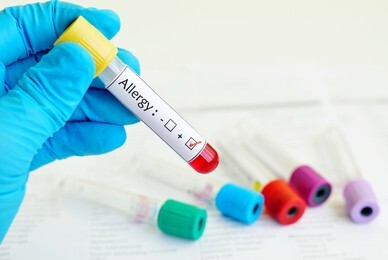
What is Allergy?
An allergy is a hypersensitivity disorder of the immune system. Allergic reactions occur when a person's immune system reacts to normally harmless substances in the environment. A substance that causes a reaction is called an allergen.
When to get tested?
If you have symptoms of a mild allergic reaction like itchy red spots on the skin, nasal congestion (rhinitis),a rash, watery or itchy eyes.
Severe allergic reactions like: abdominal cramping or pain, pain or tightness in the chest, diarrhea, difficulty swallowing, dizziness (vertigo), fear or anxiety, flushing of the face, nausea or vomiting, heart palpitations, swelling of the face, eyes, or tongue, weakness, wheezing, difficulty breathing, unconsciousness.
Allergy test can be performed irrespective of:
- Age
- Symptom
- Disease activity/or severity (e.g. active eczema)
- Pregnancy (hormone influence)
What we offer?
A Specific Quantitative Allergy test - It is an in-vitro diagnosis of allergy performed from a single blood sample. The allergen-specific IgE antibody test is used to screen for an allergy to a specific allergen. It measures the amount of that suspected IgE antibody in the blood.
What is the value of the test?
Rhinitis/Asthma Panel - Rs. Rs 7250/-
Wheezing Panel - Rs 6200/-
Food Panel - Rs. 8400/ -
Food Panel (Veg panel)-Rs 4000 /-
Food Panel (Non Veg panel) –Rs 3500/-
Eczema Panel – 6200/-
Animal Panel - Rs 1800 /- /-
Dust Panel – Rs 3600 /-
Comprehensive Panel – Rs 10000/-
Can you be allergic to more than one thing?
Yes, most people with allergies are allergic to more than 1 allergen. Their symptoms might appear only when they are exposed to 2 or more triggers at once.
How will the allergy test help you ?
The test will help to confirm whether you are allergic or not. The major use of the test is to help rule out allergy (IgE-mediated disease) as the cause of a patient's symptoms. Since inhalant allergy symptoms can be elusive and may resemble a bacterial or viral infection, a reliable atopy or allergy screen is often very cost effective.
How can a simple blood test know if I have allergies?
If you have allergies, your body produces an antibody called IgE that is specific to your allergic triggers.The test measures the amount of your IgE. Your healthcare provider can use your results to identify the specific allergic triggers that may be contributing to your symptoms.
What are the benefits of having the ImmunoCAP allergy blood test?
The test results will help you and your healthcare provider customize a treatment approach that’s right for you. Knowing your allergic triggers can help you take control and reduce your symptoms. Normal or negative results can help your doctor rule out allergies in order to other possible triggers. A simple blood test requires only one blood sample.